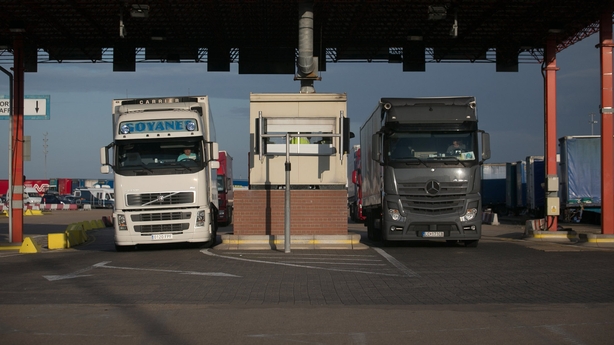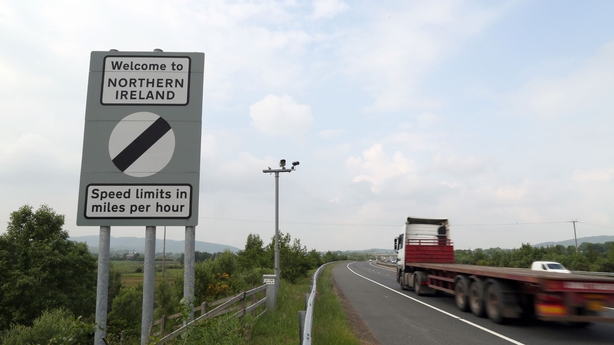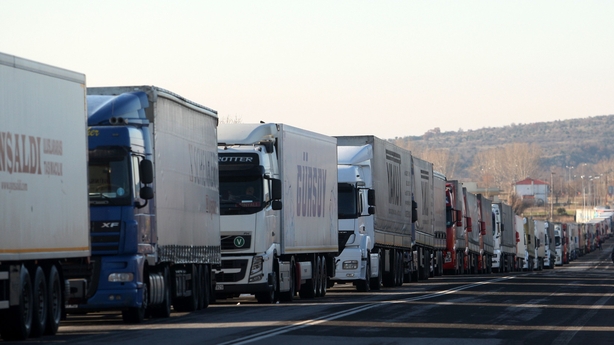The Customs Union is something we are going to hear a lot more about during the Brexit negotiations, writes Economics Correspondent Sean Whelan.

In terms of its potential to disrupt economic and political life in Ireland, Britain's relationship with the Customs Union is arguably more important than its trade agreement with the EU single market.
In short, if Britain stays in the Customs Union, it can continue to trade freely in goods with the EU member states; goods will be able to move back and forth between the UK and the EU with minimal amounts of customs bureaucracy and physical checks.
This is of particular importance to pan-European supply chains, notably in the automobile industry, where some two thirds of the components of cars assembled in the UK come from other parts of the EU.
Any Irish business that supplies "bits" to a value chain that runs through the UK is affected.
It’s also of great importance to Irish companies that export to mainland Europe via the UK "Landbridge", as it impacts on the transportation of goods.

Membership of the Customs Union would also mean Britain continues to enjoy the benefits of the Free Trade Agreements the EU has with 56 other countries around the world
If Britain leaves the Customs Union, it makes physical border controls along the Northern Ireland frontier almost certain – along with the security and political tensions that will generate.
The argument in Britain from the proponents of a hard Brexit – such as Foreign Trade Secretary Liam Fox - is that leaving the Customs Union will make it easier for Britain to negotiate its own trade deals with other countries, because it will not have to worry about the concerns of 27 other states – something that can slow down and limit EU deal making, as the views of all the states have to be taken into account.
On the other hand such an approach can complicate existing free trade agreements Britain has by virtue of its EU membership (not least with the EU itself, destination for 44% of UK exports, and source of 53% of UK imports).
The Customs Union – which does away with most customs controls among its member states – has a common external customs regime; goods imported into the customs union, regardless of where they land, are subject to the same customs rules and tariffs.
The Single European Act of 1986 did away with internal customs controls between member states and created the single market in goods (a single market in services is still a work in progress, a digital single market is a top priority issue for the EU).
If the UK leaves the customs union, any goods imported into the UK would have to undergo UK customs procedures and be subject to tariffs.
Even more complicated, if those imports are used in manufacturing or assembling products in the UK that are then exported to the EU, those products not only have to undergo EU customs processes, and pay EU tariffs, but they are also subject to EU certificate of Origin rules, requiring documentation disclosing the origin of the component parts, and stating if the correct tariffs have been applied to them.
If that sounds like a looming bureaucratic nightmare of red tape and officious customs men getting in the way of trade, then that’s exactly what it is.
Not to mention the costs, which break down into to two parts – the physical infrastructure cost of building up a new customs capacity to police the movement of goods through the borders, and the time cost of physical customs checks and processing all the extra paperwork this will generate.
The British have been talking of electronic customs procedures and new technologies to keep the border flowing freely.
The Irish Revenue Commissioners have sent staff on fact finding missions to assess how the borders between the EU, Norway and Switzerland work.
But who is going to pay for this vast hardware and software project? (Remember, we didn’t vote for Brexit).
Up until 1990, trucks going back and forth across the Northern Ireland border had to make customs declarations on each side of the border – parking up in big carparks, drivers queuing up with thick customs carnets for the bureaucrats to rubber stamp.

Time is money, and Irish exporters fear that money could be the difference between profit and loss on export sales if there is a return to any sort of border controls.
And there will be controls.
Even an electronic border with electronic customs declarations requires a spot check regime. A driver randomly pulled in could end up missing the ferry to Scotland, setting off a chain of consequences. Even the most high-tech of customs regimes are not cost free.
Judging by what British Prime Minister Theresa May had to say at her party conference speech, and in her first TV interview of this year, Britain will not be looking to stay a member of the EU single Market.
It will negotiate a specific, bespoke access agreement.
Pretty much every country on the planet has "access" to the EU single market. It’s a question of how wide ranging the access is, and how it is implemented – notably whether there are transitional arrangements, to give businesses time to adjust to the new situation, or whether there is a "cliff edge" or massive change on a single date (Brexit day is tentatively pencilled in for April Fool’s Day 2019).
The argument over which path to follow is still going on inside the UK government.
On one side are those who want to go for a "big bang" approach and leave the single market, the customs union, the jurisdiction of the European Court of Justice, the Four Freedoms and the EU budget all on the same day.
On the other, the voices arguing for continued membership of the Customs Union, Transitional Arrangements, continued UK contributions to parts of the EU budget, and a generally close relationship with the EU.
Britain’s former top diplomat in Europe Ivan Rogers – a proponent of transitional agreements – appears to have been a casualty in this internal battle over the Brexit policy (or mix of policies) to pursue.
Having set herself an end of March deadline for activating article 50, Ms May is running out of time to set her course.
The European Commission then anticipates 18 months of negotiations, ending in October of next year, to allow six months for ratification in the member states and the European Parliament of the agreement on Britain’s departure from the EU.
We know they won’t have full access to the single market, but a continuing Free Trade Agreement could minimise the disruption in most areas of business and the trade in goods.

We know services will be a difficult issue, but financial services may not be as difficult an issue as was first thought, especially now the City of London seems comfortable with equivalence rules rather than full passporting rights.
But the role of customs and the Customs Union is still unclear. Which is why I think the Customs Union question will become a really important one in the months ahead.

